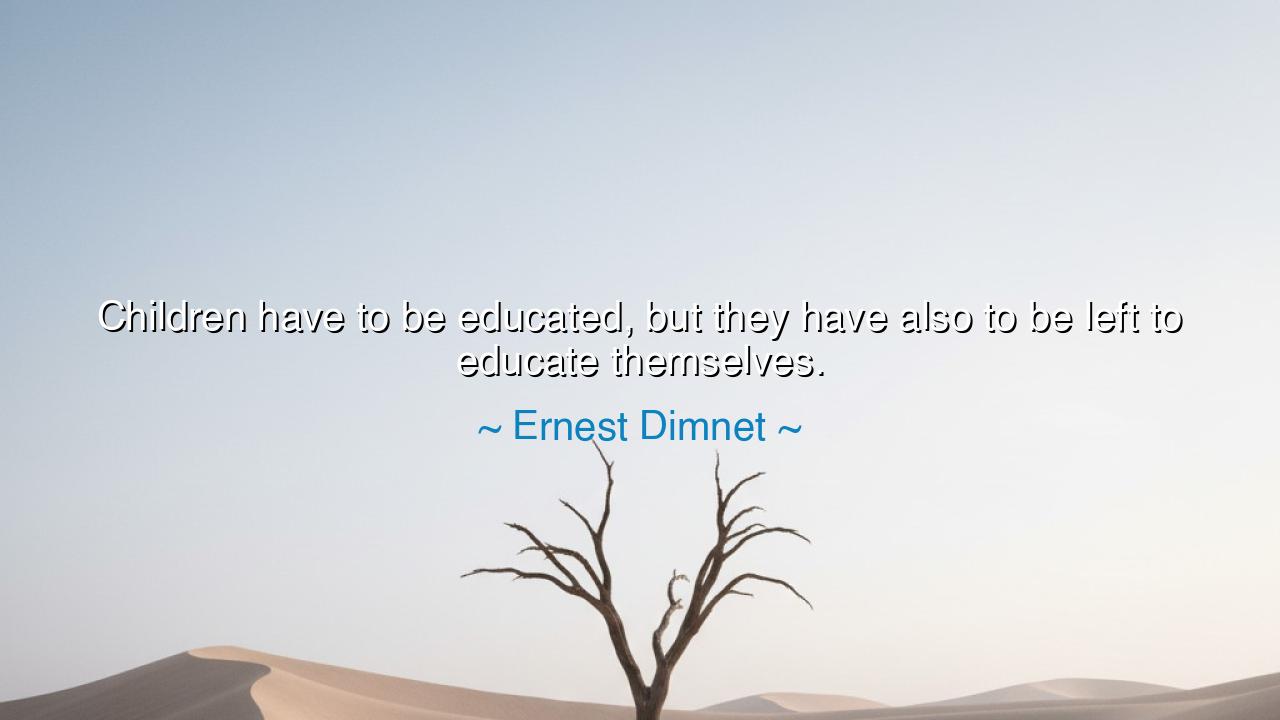
Children have to be educated, but they have also to be left to






In the luminous and reflective words of Ernest Dimnet, “Children have to be educated, but they have also to be left to educate themselves.” This truth, spoken softly yet carrying the weight of generations, reveals the sacred balance at the heart of all teaching — that knowledge must be given, yet freedom must be preserved. Dimnet, a philosopher, priest, and lover of wisdom, understood that to shape the mind of a child is not merely to fill it with facts, but to awaken within it the fire of discovery. His words remind us that education is not domination; it is guidance — a delicate dance between direction and independence, between the wisdom of the old and the wonder of the young.
The origin of this quote lies in the early twentieth century, a time when education was often rigid, mechanical, and dominated by rote learning. Ernest Dimnet, in his renowned work The Art of Thinking, sought to revive the spiritual and creative essence of learning. He warned against an education that produces conformity instead of curiosity. To him, the true teacher was not the one who spoke the most, but the one who kindled within the child a desire to think for himself. Dimnet’s words come as both a challenge and a comfort to all who guide the young — for they teach that wisdom cannot be forced into a soul; it must grow from within, like a seed finding its own way toward the light.
To educate a child is indeed a sacred duty, but it is also a perilous one, for too much control suffocates the spirit, and too little guidance leaves it adrift. The wise parent or teacher must, therefore, act as the gardener does: nurturing the soil, watering the roots, but never pulling at the stem to make it grow faster. True learning is not obedience to another’s thought, but the discovery of one’s own. The child must be guided to see, but also allowed to look; must be taught to think, but also given the silence in which thought is born. Dimnet’s insight is timeless because it speaks to the eternal rhythm of human development — that we learn first from others, and then, if we are brave, we learn from ourselves.
History gives us many examples of those who grew wise through both guidance and self-education. Consider the life of Leonardo da Vinci, who studied under great masters of his time but refused to remain bound by their methods. He wandered beyond the classrooms into the fields, the mountains, and the skies, observing the patterns of flight, the flow of water, the anatomy of creatures. His teachers had given him tools, but it was his own restless curiosity that turned knowledge into genius. Leonardo’s education was not confined to parchment and ink — it was alive, breathing, growing within him. He proves Dimnet’s point: that every great mind must, at some point, become its own teacher.
So too, Mahatma Gandhi, educated in law in the great halls of London, found his true education not in libraries but in the streets of South Africa, where injustice taught him lessons no book could offer. He said later that life itself had been his greatest teacher. Like Dimnet, Gandhi believed that learning must pass from theory into experience, and from experience into wisdom. The world is a classroom larger than any school, and the soul of man, if left to observe, question, and reflect, will teach itself truths that no instructor could ever articulate.
Ernest Dimnet’s words call us to humility as educators and courage as learners. He reminds us that knowledge imposed without freedom breeds compliance, not character. The true purpose of education is not to create perfect imitators, but independent thinkers — souls capable of truth, compassion, and self-awareness. To achieve this, we must trust the natural wisdom of the young, for within every child there lies a spark of divine intelligence, waiting to awaken. Our task is not to build the mind in our image, but to help it see its own.
The lesson, dear listener, is both simple and profound: give knowledge, but give space; teach discipline, but also imagination. Do not fear a child’s mistakes — they are the fingerprints of growth. Do not silence their questions — they are the music of the mind unfolding. Instead of forcing answers, teach them to seek truth with patience and joy. For the one who learns to think for himself is never a slave to ignorance, and the one who educates himself becomes the lifelong student of the world.
So let the words of Ernest Dimnet echo in every heart that teaches and every soul that learns: “Children have to be educated, but they have also to be left to educate themselves.” The greatest education does not end in the classroom; it begins there. It is the journey from dependence to discernment, from instruction to inspiration. To raise a generation of thinkers, not followers — that is the dream of the wise. And the world, if it is to endure, must remember this truth: that knowledge is a gift best given with freedom, and wisdom is a flame that must be allowed to burn on its own.






AAdministratorAdministrator
Welcome, honored guests. Please leave a comment, we will respond soon